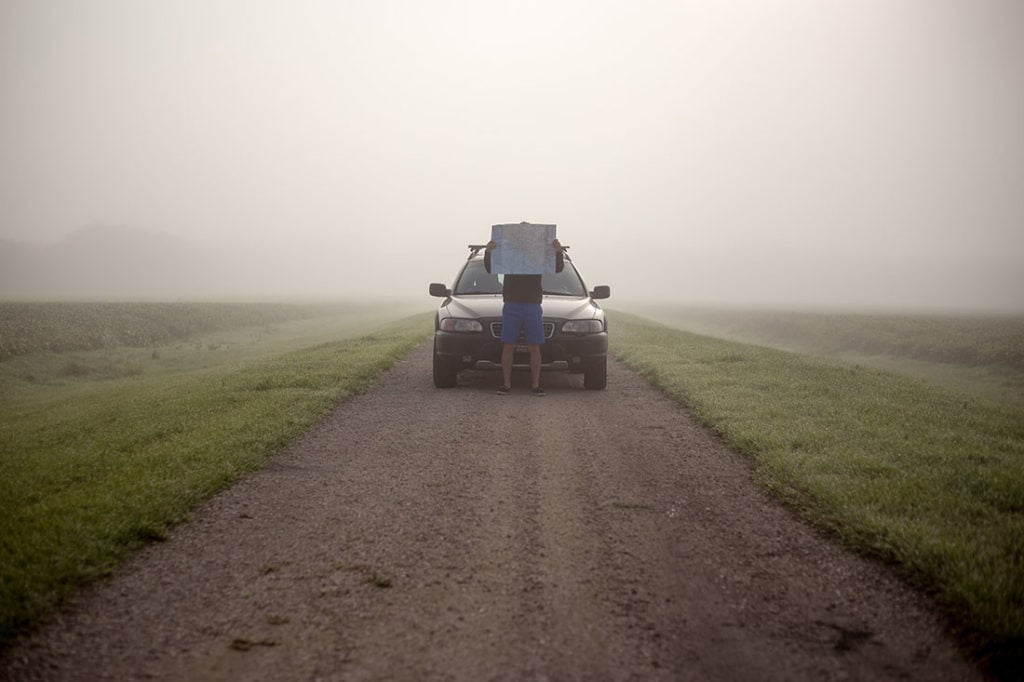As I stared at my reflection in the bathroom mirror of a Mexican restaurant, I didn’t want to go back to the table. I didn’t want to follow through with my plans. I splashed a bit of water on my face and tried to give myself a pep talk, but nothing helped. It was all just too painfully awkward.
I was at the restaurant to apologize to Chris, a regular of mine when I used to serve tables a few years back, who I had befriended and stayed in touch with. He didn’t know I was planning to apologize—or even what I’d done in the first place—so if I wanted to go the cowardly route, I could get away with it.
I thought about that when I pulled up outside of his apartment and opened the back of my SUV so that his guide dog, Westin, could hop in. I thought about it as I helped lead Chris from the parking lot to our table. I thought about it as I avoided making eye contact with myself in the bathroom mirror. How could I even explain why I was apologizing, anyway?
Let me try right now: We’ve all been in a public place, maybe a grocery store for example, and spotted someone we know before they spotted us. We didn’t feel like talking to them for whatever reason. Maybe we were in a hurry. Maybe we didn’t particularly want to talk to anyone. So we changed directions or walked down another aisle and managed to avoid the interaction altogether. It’s not a particularly nice thing to do—treating someone as if we wished they didn’t occupy the same space as us.
But how do you apologize for that? Worse yet, how do you apologize for walking right past them without saying a word? How do you apologize for using someone’s blindness to avoid interacting with them? How do you begin to fess up for doing that numerous times, months apart?
I reminded myself that this was the right thing to do, that I owed this to my friend, even if he didn’t know it. But I really didn’t want to do it. Soon, the food would be at our table. I could order another beer, tell a couple of jokes, listen to his stories and have a great time catching up.
Why ruin that?
* * *
An apology tour starts with a list.
Your first draft of that list isn’t going to be very sincere. It might be pretty short. I haven’t done all that many bad things in my life, you’ll think. But you’ll be honest enough with yourself to put one legitimate wrongdoing on the earliest version of the list. Naturally, that one will stick in your mind, and you won’t like the way it makes you feel.
Over the next few days, you’ll think of a couple more things, and you know how you’ll know they belong on the list? Because you really, really won’t want to put them on the list. These are the deeds you’d rather never think about.
In the age of the celebrity scandal, you don’t have to look hard to find really bad apologies. The comic who never uses the words sorry or apologize in his public admission. The producer who tries to redirect attention toward politics. The celebrity chef who includes a recipe at the end of his statement.
It can be hard to take ownership of the bad things we’ve done. Everyone wants to be good. Only psychopaths want to hurt others. But we all do. Which means we all walk around carrying the burden of our misdeeds, large and small, even if we’ve convinced ourselves we don’t. Even if we’ve pushed those thoughts to the farthest recesses of our minds, they’re still there. What happened happened.
It can be hard to take ownership of the bad things we’ve done. Everyone wants to be good. Only psychopaths want to hurt others. But we all do.
A good apology, it’s generally thought, should bring some relief to both parties, perhaps even unburdening each of them. That notion changes a bit when you prepare yourself for a tour of apologies. I didn’t feel comfortable expecting to get something out of each one. I couldn’t make it about my feelings or even about their reactions because I knew I couldn’t control their reactions. And if I wasn’t forgiven for one, I’d still have to convince myself to do more of them. I told myself it was about giving each of these people something they deserved, and trying to deliver that thing as sincerely as possible.
(By contrast, the worst thing an apology can do—and what the 12-step programs warn against when asking people to make amends—is hurt the wronged person all over again. It requires striking a balance, but really it just requires empathy.)
Related: 20 Ways to Build Empathy
I’m not an alcoholic, but I knew there was a vague haze over some of these relationships. Maybe I was the only one who felt it. Maybe, that is just what guilt felt like. That’s what pushed me to go on an apology tour, the idea that maybe the anxiety I felt at such a prospect might lift that feeling, whatever it was. I know that there is no magic restart button for relationships, but maybe this could be something like a refresh button. Ultimately I just dove in to see what I’d find out about myself on the other side.
The final edition of my list felt pretty well-rounded. Some were minor slights. A few inclusions were sources of shame. Nothing too dark, but most required conversations that sounded awkward and uncomfortable.
The criterion was vague, but strict: If it remained on my mind until I put it on the list, then I’d apologize for it.
I started with one of my oldest and closest friends.
* * *
Clark and I have basically been workshopping different versions of the same stupid jokes since we were freshmen in high school. You’d be surprised how well a shared love of The Simpsons can sustain a friendship.
We both finished college and pursued careers with no clear road map. I wanted to be a writer, and he wanted to work in various aspects of sports and public relations. His opportunities came earlier than mine. Before I had any coherent idea of what it meant to be a writer, he was landing internships with Major League Baseball and the National Football League and living in exciting places where people who follow their dreams end up: Los Angeles, San Francisco, New York.
Meanwhile, I was working as hard as I possibly could and felt like I had nothing to show for it. I was broke and embarrassed about my prospects. I probably went two or three years in my early 20s without once congratulating, supporting, or encouraging Clark in his career. That’s what I wanted to apologize for.
When I called him, we spent five minutes joking about nothing of consequence while I paced back and forth outside of a Starbucks. As I tried to casually segue, I could already hear my voice rise and shake before I got out the words, “So, the reason I wanted to talk…” I rambled, but I spit it out. I told him I had been riddled with insecurity and that I was proud of him and had always wanted him to succeed, but had been too wrapped up in myself.
Then I waited, embarrassed to have burdened him with this.
He didn’t miss a beat. He told me that he didn’t feel I had to apologize, but that he accepted and was glad that I’d be willing to talk to him about it. He also confirmed what I had always felt guilty about.
“I know New York and San Francisco can look cool on a social media post, but those times were pretty rough for me,” he said. “I was making a ridiculous salary for those cities, in a bad way. I was working late and sacrificing weekends.”
Not many people would have been able to relate to his anxieties at that time more than me. And that’s why I had to say I’m sorry. So we wrapped it up and I felt simultaneously overwhelmed and relieved. I’d said aloud something I’d mostly avoided even thinking about, but I also knew I’d done something positive for our friendship.
Related: The Science of Friendship
“I’d rather you have talked to me about being insecure than congratulate me,” Clark said. “Anyone can congratulate me, and it doesn’t necessarily mean that much.”
An hour later I texted him an obscure joke from The Simpsons. He texted one right back.
* * *
Without Google, I don’t know how I would have tracked down my ninth and 10th grade Spanish teacher. She’s still teaching, but at a school six states away from the one where she attempted to teach me.
I say attempted because my group of friends barely allowed her to teach. She was young and new to teaching, and she never really stood a chance. We talked back. We didn’t listen. We were nightmares. She sent me to the principal’s office so many times the principal couldn’t keep up, so I’d usually just walk around campus until the period ended.
I think I saw her crying in her office during lunch break one day, and I promise you that was not fun to write just now.
She lasted two years.
Before reaching out over email, I hadn’t spoken to her in 12 years. On the day we were supposed to talk on the phone, I was so anxious I could barely eat.
I made clear in an email that I was apologizing to people throughout my life and that she was someone that I had thought of. So the facade of small talk I tried to make when she picked up the phone was so hilariously awkward that it actually may have put us both at ease a bit.
I eventually told her that I knew my friends and I weren’t particularly kind or respectful to her. I told her that I had convinced myself that I hated her back then, but that I couldn’t think of anything that the 28-year-old version of myself would dislike about her.
“I made bad grades in your class because I didn’t try and because I undermined your attempts to teach me,” I said. “But I managed to blame you. I know the way I treated you deserves an apology and I’m sorry.”
I had brought a notepad and pen into the room where I made the call in case I needed to take notes. When I looked down, my pen was in six pieces, having nervously been taken apart while I was speaking.
She accepted my apology immediately, and issued one of her own. “I was the adult in the room,” she said. She told me that she was going through a lot personally and that she tries to put that time in the back of her mind. Going to graduate school after leaving my high school was great for her and she’s teaching again. “If I didn’t go through that trial by fire with you guys I wouldn’t be the best teacher I can be.”
She asked that I not use her name if I wrote about her, but told me she appreciated the call. We caught up for a few more minutes. I realized she was only 21 when she started as my teacher, and I couldn’t imagine how I’d handle that job at 21. Then she said something that confirmed her place on my list.
“When I went back to teaching, I was pretty anxious my first couple weeks,” she said. “I would have nightmares that I’d be in class and it wouldn’t be going well. Then, some of you guys would be in the class, too, and it would keep going downhill.”
It knocked the air out of me. I was literally a monster in her nightmares.
“I really am sorry.”
I hoped that, maybe, the phone call gave her the slightest bit of closure on that experience. But I still didn’t have an appetite by dinner.
It knocked the air out of me. I was literally a monster in her nightmares.
* * *
Sometimes there won’t be crippling guilt hanging over you for a wrongdoing. Sometimes you’ll just move on, or you get away with something, and you’re too wrapped up with yourself to take the time to apologize. You basically missed the window for the casual apology, so if it were ever to come up you could play it off as funny. I mean, come on, no one got hurt. But if you respect those people enough, you can still reach back, and you can take your medicine.
That’s what happened when I decided to reach out to Mary, Kelsey, Emily and Rachel and apologize for Mardi Gras 2013.
They shared a house in St. Louis, where I went to college, not far from the annual Mardi Gras parade—an event heavily attended by people of all backgrounds bonding over French culture and a shared opportunity to start drinking before noon.
Having friends with a house near the parade is no small thing for someone partaking in the festivities. Having a home base to return to is crucial if you need a couch to rest on, a moment’s break from the Missouri winter, or perhaps most importantly for an event encouraging so much liquid absorption, a bathroom.
By mid-afternoon, friends and friends of friends were going in and out of the house. That’s when my buddy and I—less than clear of mind—came up with an on-the-spot business venture as we saw passersby desperately seeking facilities. We charged strangers $5 to use our friends’ bathroom without their knowledge. In total, we probably only made about $10.
Maybe $15.
No more than $20.
So I scheduled calls with all four of them. My goals were simple: Don’t tell the story like it’s funny, take responsibility, sincerely apologize and send each of them $5.
Rachel instantly accepted my apology. Kelsey immediately sent my $5 back. Emily apologized more times for taking a few days to return my text than I did for renting out her bathroom. Mary did a pretty bad job of hiding her laughter as I tried my hardest to be genuine and apologize.
All four of them couldn’t have made it easier. And yet it still wasn’t easy. None of my apologies were, even the ones with people I was close with or who I knew didn’t harbor much resentment. It was emotionally exhausting. I didn’t want to do anything for the rest of the day.
I was uncomfortable every time. I could hear my voice change as I tried to apologize. I called a friend who I had seen briefly at a wedding last fall, and felt I had been rude in that interaction. Apologizing for something small was its own kind of awkward. Her response was thoughtful and appreciative, but all I heard was the voice in my head. She thinks it’s weird that you’re doing this.
Apologizing meant coming face to face with my insecurities. There was some personal deficiency, some actual character flaw at the root of everything I ended up apologizing for. Even as I write this, there’s more insecurity. I’m legitimately anxious about this story coming out and various people thinking He went on an apology tour? Where was my apology for the time he…
Spending so much time focused on your past misdeeds takes a toll, too. After Mary listened to me apologize for my Mardi Gras sins, she offered a little advice. “Make sure you forgive yourself, too,” she said in the casual tone of someone clearly more comfortable with genuine sentiment. “Self-forgiveness is a really important thing.”
At the time, I brushed it off as a typically kind thing coming from a characteristically kind person; something that feels good, but you don’t really process. But as the apologies accumulated, it helped me through the anxiety.
These friendships all survived without an apology. I didn’t actually need to feel guilty. I just needed to give them the apology they deserved.
In some sense, apologizing is like paying a debt. We don’t pay off debt because it feels good. It usually doesn’t feel very good. We pay our debts because it’s the right thing to do.
We all have a perception of ourselves, but to every other living person, we are whatever our actions suggest we are. And that’s a difficult concept to reckon with. But once you’ve put yourself through enough of them, you realize that an apology is an action. Its purpose isn’t to cancel out the wrongdoing, it’s to correct the perception that the wrongdoing is a reflection of the person who was wronged.
In some sense, apologizing is like paying a debt. We don’t pay off debt because it feels good. It usually doesn’t feel very good. We pay our debts because it’s the right thing to do.
* * *
I left the bathroom, walked to our table where Chris was sitting and started apologizing. I felt my face get warm as the waiter refilled my water and tried to look like he wasn’t listening.
Chris and I used to grab lunch every month or two. One day he tried to set me up with a girl he knew. That relationship sort of happened until it sort of stopped happening. Chris saw this girl often and I convinced myself she might talk about me, and maybe even say negative things (see: general insecurity). So I avoided Chris, who despite being blind, walks all over the city with Westin, running errands.
“The first time, as you approached closer, I started to realize I didn’t have to stop and chat. Then I think I felt some shame and it snowballed, and I did it a handful of other times.”
Maybe it was just guilt, but each time I could swear the dog recognized me.
Since the last time I spoke to Chris, he’d had two strokes and multiple surgeries. He played it all off as minor, but when I began to process at dinner that I might have weaseled out of what could have been my last opportunity to speak to him,
I almost started to cry. It was one of my final apologies, and I didn’t feel particularly good about myself. Maybe he sensed it.
“I think the world of you,” Chris said. “I had assumed that you got more and more busy and had moved on in life. I was proud of you. You were serving tables when we met.”
We agreed to get together for dinner every few months.
“That way,” Chris said, “you’ll have nothing to apologize to me for.”
Related: How Would Your Friends Rate You?
This article was originally published by Longreads and appeared in the Fall 2018 issue of SUCCESS magazine.










